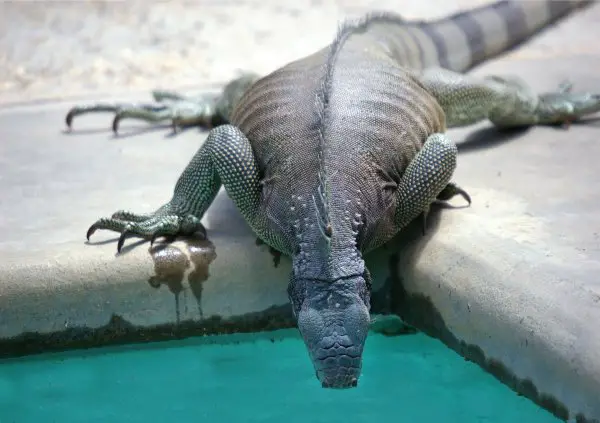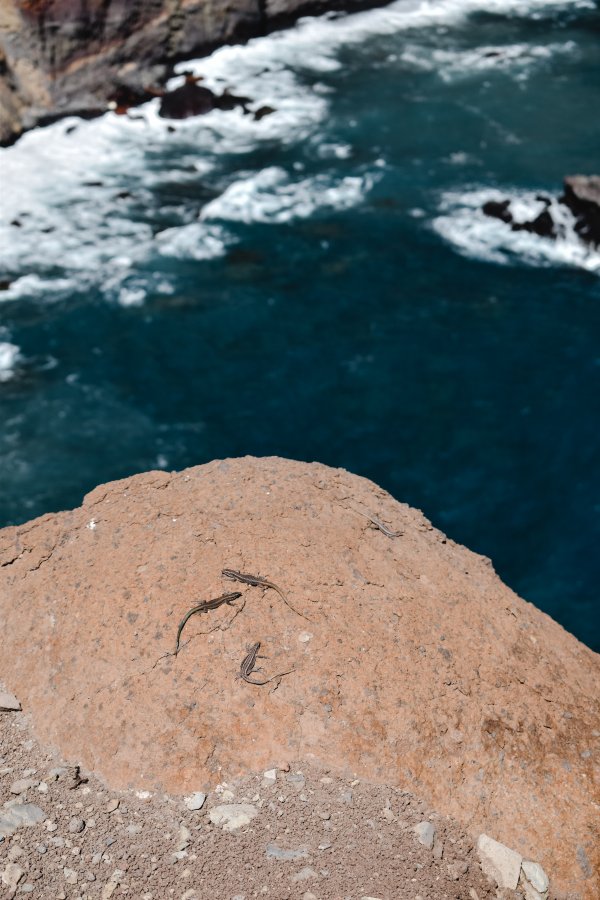Can Lizards Swim In Pools?
If you have a swimming pool and a pet lizard you my be concerned, or worried that it will fall in. But can they survive if thi happens?
Can Lizards Swim In Pools?
Yes! While pools are dangerous for lizards because it’s hard for them to get out, they are quite adept at swimming. Their tails can propel them efficiently through the water, while their front limbs help to provide them with vertical control.
| Are these foods dangerous for your Beardie? | |
| Avacado? Click here to learn, from this guide, if this food is dangerous |  |
| Superworms? Click here to learn, from this guide, if this food is dangerous |  |
So, now you know. But, what types of lizard can swim? Do lizards, generally speaking, like water? Should you keep your pool covered to be safe? Keep reading for these answers, and much more…
What types of lizards can swim?

Lizard drinking water from a pool.
Every lizard is equipped for a brief swim and while some are specialized for running across the water, only one lizard in the world is actually well-suited for swimming.
You’ll only find them on the Galapagos Islands and they are known as Marine Iguanas. Marine Iguanas can not only swim, but they spend lots and lots of time in the ocean, as they are well-adapted for this purpose.
The lizards can dive down to depths of up to 65 feet deep and while they are underwater, they can have their specialized, flattened tails for superior underwater propulsion and their large, blunt snouts for grazing on underwater algae.
While they generally spend only a few minutes underwater when grazing, it is not uncommon for these lizards to stay underwater for 30-minute periods of time and they can even sneeze out excess salt from the water, as an added functionality of their nasal glands.
All lizards can swim a little, but Marine Iguanas are definitely pros! Some lizards, such as the Green Basilisk, could even run across the water in your pool to eat a tasty butterfly that happened to be hovering over it!
Do lizards like water?
Aside from Marine Iguanas and lizards that can run on water, such as the Australian Frilled lizard or the South American Basilisk, it would be hard to say whether or not lizards actually like water. We can say, however, that all lizards are certainly attracted to it and when they find it, many are well-equipped to use it to its fullest.
Desert lizards are a great example. Lizards like the Texas Horned lizard actually have tiny tubes in their skin which may only be viewed through powerful magnification. These tubes allow the lizards to absorb water and retain it, and this important adaption allows them to live and thrive in a desert environment.
Should you cover your pool if you have a lizard?
If there is a chance that your lizard could get out and get into the pool, then covering it might be a good idea. While lizards can swim in pools, lakes, and just about any other bodies of water that they run into, there is still the matter of getting safely out of the pool is no one is nearby to help.
A panicked lizard might be able to get out if there are stairs installed in the pool or a ladder that it could cling to for safety, but in most cases, with the slick, high walls of the pool a lizard is in danger of drowning before they can find an exit.
What Lizard is the best swimmer?

Lizards on brown ground.
If we had to pick who was the best swimmer next to the Marine Iguana, we’d have to say it would be the Green Basilisk. Capable of running across the water to evade predators or to catch some tasty prey, these lizards are found in Central American, ranging in territories from southern Mexico to Panama!
Their amazing water-walking ability has actually earned them some interesting nicknames and while you’d think that they would need to be tiny, these guys can grow up to 3 feet in length! Before you ask, the answer is ‘yes’ – these water-walking wonders are actually kept as pets sometimes and live for about 8 – 12 years in captivity.
Can Geckos swim in pools?
Geckos can certainly swim if they accidentally fall into a pool, but only for short periods of time. A gecko that doesn’t find something to cling to or to climb out of the pool is in very real danger of tiring out and drowning.
Even a brief dip is ill-advised, as the chlorine is certainly not good for your gecko’s skin, either. If you are playing with a gecko close to your pool and it falls in, you’ll want to get it out of the pool as fast and gently as possible.
A mesh pool net is ideal, as you can scoop them out and get them somewhere dry with the least amount of stress. Using a net instead of simply jumping in to grab them can help to avoid your frightened gecko going into shock.
Can some Geckos walk on water?
While they can’t run across it in a freaky-cool way like the Green Basilisk, surface Geckos can actually run on water using all four limbs at approximately the same speed that they can run on land! They can only do it for small periods of time, however, and it’s generally reserved for moments of panic or for catching prey that has fled over the water.
The trick in this water walking in the surface gecko’s case has to do with their feet, which have specialized microstructures in them that allow for gripping a number of surfaces – including the water. These microstructures move in an ‘s’ shape, allowing them to ‘push and pull’ themselves over the water’s surface quite swiftly for their brief forays on the H2O.
Can a house lizard survive in water?
Only for a very brief time. A house lizard can swim briefly in the water but eventually is going to tire out. If the lizard doesn’t find an exit from the pool at this time, then drowning is a very real possibility.
If your house lizard has escaped and you do not have a way to cover the pool, you might want to consider putting some flotation toys inside, but they will need to be something that the lizard can grip if it accidentally falls in the pool.
Lifebuoys, aka ‘life preserver rings’ are a good example, as they are made from Styrofoam that your lizard could potentially grip with it’s claws and cling to until you can find them but you should still keep a close eye on the pool as much as possible. House lizards cannot survive for very long if they get stuck in the water.
Where do lizards in the desert get their water?
Lizards in the desert, barring a direct and lucky find of water, can get the water they need largely from ingesting insects. Their scales are designed to keep water in and some even have special tubules in their skin that can absorb water should a damp area actually be found.
Their efficient processing and conservation of water means that they aren’t wasting a single drop. This is further proven in the composition of their urine. While urine is mostly made of a mix of urea and water for most animals, a lizard uses their water so efficiently that their urine is almost 100% urates!
What kind of lizards live in water?
Actually, none. The closest thing that we have is the Galapagos Marine Iguana and while it can dive into saltwater and forage on algae there, it doesn’t make its home there. The ocean water is simply one of the places where this highly specialized lizard gets its meals.